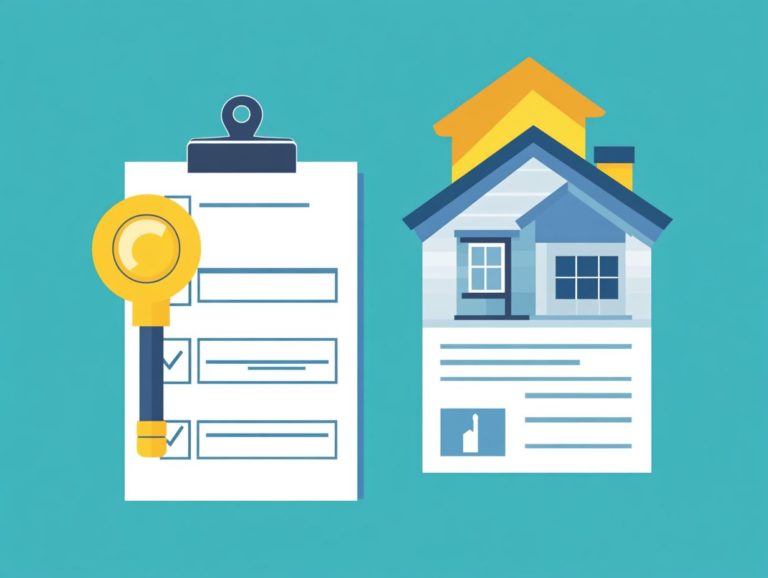The Process of Obtaining a Jumbo Loan
If you’re contemplating the purchase of a high-value property, understanding jumbo loans is essential.
Unlike conventional mortgages, jumbo loans are designed for individuals who want to borrow amounts exceeding conforming loan limits, often for luxury homes or unique properties.
This guide helps you understand the qualifications for a jumbo loan by detailing the income and credit requirements, the application process, and how to effectively work with lenders.
By the end, you will be well-equipped to confidently navigate the financing landscape and secure the funds necessary for your investment.
Contents
- Key Takeaways:
- Qualifying for a Jumbo Loan
- The Application Process
- Working with a Lender
- Closing on a Jumbo Loan
- Finalizing the Deal
- Understanding Closing Costs
- Frequently Asked Questions
- What is a jumbo loan and why would someone need one?
- What are the requirements for obtaining a jumbo loan?
- What is the process for applying for a jumbo loan?
- How long does it take to get approved for a jumbo loan?
- What are the potential downsides of obtaining a jumbo loan?
- Is it possible to refinance a jumbo loan?
Key Takeaways:

Jumbo loans are mortgages that exceed the conforming loan limit and have higher qualification standards.
To qualify for a jumbo loan, borrowers must have a high income, excellent credit, and a substantial down payment and assets.
The application process for a jumbo loan involves providing extensive documentation and closely collaborating with a lender to negotiate terms and rates.
What is a Jumbo Loan?
A jumbo loan is a mortgage option that exceeds the conventional limits set by the Federal Housing Finance Agency (FHFA), making it attractive if you re looking to buy a home in high-cost areas like Hawaii and Alaska.
Unlike conforming loans, which have specific guidelines and caps, jumbo loans offer flexibility to finance properties valued significantly higher, targeting a specialized segment of the real estate market.
However, get ready for higher credit and down payment standards to secure your dream home! Lenders consider these loans to be at a higher risk.
In essence, a jumbo loan provides funding beyond the typical limits governing conforming loans, which usually cap around $726,200 in most regions. The importance of jumbo loans in today s housing market is significant, especially as rising home prices push buyers like you beyond standard borrowing limits.
With many affluent buyers searching for properties in desirable areas, mortgage rates for jumbo loans are often becoming more competitive. This trend not only expands your financing options for premium properties but also reflects the evolving needs of borrowers navigating a complex market.
Qualifying for a Jumbo Loan
Qualifying for a jumbo loan requires you to meet higher standards than traditional mortgages. It s crucial to focus on key factors such as your credit score, debt-to-income (DTI) ratio, and down payment amounts.
Higher risks come with these loans; lenders typically expect a minimum down payment ranging from 10% to 20% or more, which significantly affects your borrowing experience.
Additionally, substantial cash reserves are often needed to reassure lenders of your capability to handle higher interest rates and closing costs.
Income and Credit Requirements
When applying for a jumbo loan, it’s essential to demonstrate stable income and a strong credit score. Lenders usually look for a credit score of 700 or above, although some may be flexible if other factors favor you.
This requirement showcases the heightened risk associated with non-conforming loans, ensuring you have the financial means to manage those larger repayments. Therefore, demonstrating a reliable income stream and a solid credit profile is vital for securing favorable terms and rates.
To further enhance your chances, aim to present a comprehensive financial history with minimal debt-to-income ratios ideally at 43% or below. Lenders will analyze various income sources, including salary, bonuses, and rental income, to verify consistency and reliability.
A strong financial profile not only leads to better interest rates but also improves your standing with mortgage lenders, who tend to be cautious about approving amounts significantly above conventional loan limits.
In essence, if you’re pursuing a jumbo loan, prioritize maintaining a healthy credit profile and demonstrating financial stability to effectively navigate the complexities of securing such a significant investment.
Down Payment and Asset Requirements
The down payment for a Jumbo Loan usually demands more than a conventional loan. The minimum requirement often falls between 10% and 20% of the property’s purchase price. This amount is influenced by both the lender’s criteria and your financial profile.
Alongside the down payment, lenders expect you to have considerable cash reserves as a safety net for any unforeseen financial challenges. You need to show that you have enough liquid assets to cover several months worth of mortgage payments. This ensures you can manage those higher interest rates.
Asset verification is crucial. Lenders will examine your financial documents to assess your overall stability. If you re considering investment properties, understanding these requirements is essential. Missing the mark could lead to steeper interest rates or even a denial of your loan application.
Cash reserves not only bolster your financial standing but also provide lenders with confidence in your long-term repayment capability. Securing a Jumbo Loan involves navigating these intricate conditions, so it’s crucial to be well-prepared to handle the associated risks.
The Application Process

The application process for a Jumbo Loan can be more intricate than that of traditional mortgages. As a borrower, you’ll need to submit a detailed mortgage application with a variety of supporting documents.
This includes income verification, asset statements, and identification. Since these loans typically involve larger sums, an appraisal is often required to determine the property’s value, which is essential for establishing the loan amount.
Understand the closing costs; they can significantly affect your total financial commitment.
Required Documents
When you apply for a Jumbo Loan, you’ll need to submit various documents to validate your financial status and eligibility. This may include recent pay stubs, tax returns, bank statements, and proof of assets.
These documents are crucial for lenders as they assess your creditworthiness and ability to repay the loan. You must meet the necessary standards for loans that don t meet standard limits. Given the higher loan limits associated with Jumbo Loans, thorough documentation is essential to streamline the approval process.
Recent pay stubs are particularly important, providing a snapshot of your current income stability. Tax returns give an overview of your financial performance over the past few years, highlighting any discrepancies in earnings.
Bank statements demonstrate your liquidity and responsible financial management, assuring the lender of your ability to maintain mortgage payments. Proof of assets offers further reassurance regarding your financial resilience, giving a clear picture of your net worth.
Together, these documents create a solid foundation for your financial assessment, enabling lenders to make well-informed decisions about your application.
Timeline and Steps
The timeline for securing a Jumbo Loan can vary based on several factors, including lender processing times and the complexity of your application. On average, expect the entire process from initial application to closing to take between 30 to 60 days. The faster you gather your documents, the quicker the process will move.
Your journey typically begins with obtaining pre-approval, which gives you an estimate of how much you can borrow and valuable insights into the lender s criteria. Next, you ll need to submit detailed documentation, including income statements, credit histories, and asset information.
The main milestones in this process include:
- Initial application review
- Appraisal scheduling
- Underwriting
- Closing meeting
Each of these steps is critical in determining whether your loan will be approved and how swiftly the process can move forward. This significantly influences the overall speed of your journey.
Working with a Lender
Working with a mortgage lender is crucial for getting a Jumbo Loan. Lenders understand loans that don’t meet standard guidelines and can provide valuable insights.
Building a strong relationship with your lender can streamline your application experience. This may lead to opportunities for negotiating better terms and rates.
Select a lender who understands the complexities of jumbo loans. This ensures you receive the best approval and financing options available.
Choosing the Right Lender
Choosing the right lender for a Jumbo Loan is crucial. A lender’s experience with non-conforming loans can greatly influence your financing options and overall experience.
As a prospective borrower, research various lenders. Compare rates and look for positive reviews from past clients to gauge their reliability and service quality.
Consult lenders who specialize in jumbo loans. They have a deeper understanding of the unique requirements and market conditions associated with jumbo mortgages.
Evaluating customer service is equally important. A lender who prioritizes open communication and responsiveness can simplify the mortgage process for you.
Explore testimonials and star ratings across multiple platforms. This will give you a well-rounded understanding of their performance.
Consider factors like loan limits, fees, and processing times. By taking the time to assess these criteria, you can make a more informed decision, ensuring a smoother path to securing a jumbo loan.
Negotiating Terms and Rates
Negotiating terms and interest rates with your lender can significantly influence the overall cost of a Jumbo Loan. This phase of the mortgage process is crucial and should not be overlooked.
Approach negotiations with a clear understanding of your financial position and current market trends. Discuss various loan options and fees to find an arrangement that aligns with your financial goals.
Keep yourself updated on changing interest rates; even a small shift can impact your monthly payments and the total cost of the loan. Use online tools and resources to compare prevailing rates.
Always inquire about hidden fees or points that could affect your expenses. Transparency is vital for building trust with lenders. Additionally, showcasing a solid credit history can give you leverage in negotiations, allowing you to negotiate lower rates or waive certain fees.
With the right preparation and strategies, you can navigate this complex landscape and secure a deal that fits your needs perfectly. Start your negotiations today to find the best rates for your Jumbo Loan!
Closing on a Jumbo Loan
Closing on a Jumbo Loan marks the culmination of the mortgage journey. Here, you sign the final documents, finalize the terms, and facilitate the transfer of funds.
As the closing date approaches, prepare to review all associated closing costs meticulously. These may include appraisal fees, title insurance, and other expenses that could arise during the closing process.
By understanding these components, you can avoid unwelcome surprises as the transaction comes to a close.
Finalizing the Deal
Finalizing the deal on a Jumbo Loan requires a careful review of all relevant documentation, including the loan agreement, disclosures, and any additional paperwork the lender may require. Understanding the terms of your deal is essential for ensuring you and the lender are aligned on your obligations moving forward.
Navigating this process effectively can help prevent future disputes and ensure that the loan conditions work in your favor. Pay close attention to conditions set by the lender, such as income verification and property appraisal requirements. Understanding these elements is vital for compliance and avoiding last-minute surprises as the closing date approaches.
Reviewing fees associated with the loan, like origination and closing costs, is essential. It allows you to assess the financial implications in depth. This careful examination paves the way for a smoother transaction process, enabling you and the lender to fulfill your roles responsibly and confidently as you embark on this significant financial commitment.
Understanding Closing Costs
Understanding closing costs is crucial when finalizing a Jumbo Loan, as these expenses can greatly influence your overall financial commitment. These costs often include appraisal fees, title insurance, and various charges, typically ranging from 2% to 5% of the loan amount.
By familiarizing yourself with these costs, you can budget effectively and avoid unexpected financial surprises on closing day. Key components of these costs are essential to the mortgage process. For example, appraisal requirements are vital; lenders need to confirm that the property’s value matches the loan amount, which usually means hiring a professional appraiser an expense that can vary significantly.
Title insurance is another important consideration, as it protects you from any future claims on the property. Grasping all these fees is imperative, as they collectively impact the total cost of your mortgage, making careful planning and awareness invaluable while navigating the complexities of a Jumbo Loan.
Frequently Asked Questions
What is a jumbo loan and why would someone need one?

A jumbo loan is a type of home mortgage that exceeds the conforming loan limits set by government-sponsored agencies. This type of loan is necessary for individuals looking to buy a high-priced or luxury home that requires a larger loan amount than traditional mortgages allow.
What are the requirements for obtaining a jumbo loan?
The requirements for obtaining a jumbo loan may vary depending on the lender, but borrowers generally need a strong credit score, a low debt-to-income ratio (the amount of your monthly income that goes toward paying debts), and a significant down payment. Lenders may also require proof of income and assets, such as tax returns and bank statements.
What is the process for applying for a jumbo loan?
The process for obtaining a jumbo loan typically involves completing a loan application, providing documentation to verify your income and assets, and undergoing a thorough credit check. The lender will also assess the property you are looking to purchase to determine its value and confirm it meets their standards.
How long does it take to get approved for a jumbo loan?
The timeline for getting approved for a jumbo loan can vary, but it generally takes longer than a traditional mortgage due to the higher loan amount and stricter requirements. On average, it can take anywhere from 30 to 60 days for a lender to approve a jumbo loan application.
What are the potential downsides of obtaining a jumbo loan?
One downside of obtaining a jumbo loan is that the interest rates may be higher than those for traditional mortgages, which could result in larger monthly payments. Additionally, jumbo loans may require a larger down payment, making it more challenging for some borrowers to qualify.
Is it possible to refinance a jumbo loan?
Yes, it is possible to refinance a jumbo loan. However, it may be more challenging due to the larger loan amount and stricter requirements. It’s essential to carefully consider the potential costs and benefits before deciding to refinance a jumbo loan.






